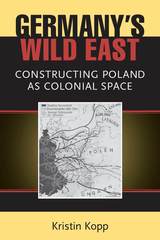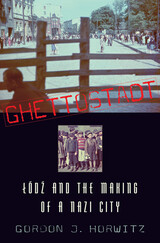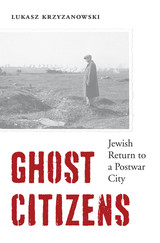4 start with G start with G

While conventional definitions locate colonial space overseas, Kristin Kopp argues that it was possible to understand both distant continents and adjacent Eastern Europe as parts of the same global periphery dependent upon Western European civilizing efforts. However, proximity to the source of aid translated to greater benefits for Eastern Europe than for more distant regions.

The stories examine the relationship between inmates and their families, their friends, their Christian former neighbors, the German soldiers, and, ultimately, the world of hopelessness and desperation that surrounded them. In using his creative powers to transform the suffering and death of his people into stories that preserve their memory, Spiegel succeeds in affirming the humanity and dignity the Germans were so intent on destroying.
Originally published as Malchut geto (Malkhes geto) in Yiddish.

Under the Third Reich, Nazi Germany undertook an unprecedented effort to refashion the city of Łódź. Home to prewar Poland’s second most populous Jewish community, this was to become a German city of enchantment—a modern, clean, and orderly showcase of urban planning and the arts. Central to the undertaking, however, was a crime of unparalleled dimension: the ghettoization, exploitation, and ultimate annihilation of the city’s entire Jewish population.
Ghettostadt is the terrifying examination of the Jewish ghetto’s place in the Nazi worldview. Exploring ghetto life in its broadest context, it deftly maneuvers between the perspectives and actions of Łódź’s beleaguered Jewish community, the Germans who oversaw and administered the ghetto’s affairs, and the “ordinary” inhabitants of the once Polish city. Gordon Horwitz reveals patterns of exchange, interactions, and interdependence within the city that are stunning in their extent and intimacy. He shows how the Nazis, exercising unbounded force and deception, exploited Jewish institutional traditions, social divisions, faith in rationality, and hope for survival to achieve their wider goal of Jewish elimination from the city and the world. With unusual narrative force, the work brings to light the crushing moral dilemmas facing one of the most significant Jewish communities of Nazi-occupied Eastern Europe, while simultaneously exploring the ideological underpinnings and cultural, economic, and social realities within which the Holocaust took shape and flourished.
This lucid, powerful, and harrowing account of the daily life of the “new” German city, both within and beyond the ghetto of Łódź, is an extraordinary revelation of the making of the Holocaust.

The poignant story of Holocaust survivors who returned to their hometown in Poland and tried to pick up the pieces of a shattered world.
In the immediate aftermath of World War II, the lives of Polish Jews were marked by violence and emigration. But some of those who had survived the Nazi genocide returned to their hometowns and tried to start their lives anew. Lukasz Krzyzanowski recounts the story of this largely forgotten group of Holocaust survivors. Focusing on Radom, an industrial city about sixty miles south of Warsaw, he tells the story of what happened throughout provincial Poland as returnees faced new struggles along with massive political, social, and legal change.
Non-Jewish locals mostly viewed the survivors with contempt and hostility. Many Jews left immediately, escaping anti-Semitic violence inflicted by new communist authorities and ordinary Poles. Those who stayed created a small, isolated community. Amid the devastation of Poland, recurring violence, and bureaucratic hurdles, they tried to start over. They attempted to rebuild local Jewish life, recover their homes and workplaces, and reclaim property appropriated by non-Jewish Poles or the state. At times they turned on their own. Krzyzanowski recounts stories of Jewish gangs bent on depriving returnees of their prewar possessions and of survivors shunned for their wartime conduct.
The experiences of returning Jews provide important insights into the dynamics of post-genocide recovery. Drawing on a rare collection of documents—including the postwar Radom Jewish Committee records, which were discovered by the secret police in 1974—Ghost Citizens is the moving story of Holocaust survivors and their struggle to restore their lives in a place that was no longer home.
READERS
Browse our collection.
PUBLISHERS
See BiblioVault's publisher services.
STUDENT SERVICES
Files for college accessibility offices.
UChicago Accessibility Resources
home | accessibility | search | about | contact us
BiblioVault ® 2001 - 2024
The University of Chicago Press









